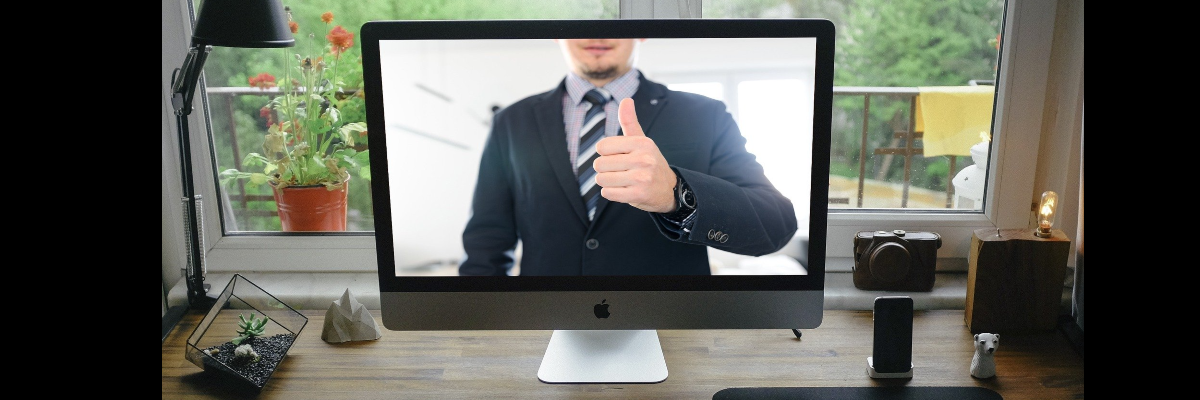Authored by Lindy Kingsford.
Meeting face to face is always the best way to interview a candidate, but with current restrictions and changes in how we’re all working, the online interview is taking centre stage. A search/recruitment process always involves a series of interviews and most of those are now conducted online via Zoom or Teams, or any number of online platforms now available.
As an executive search specialist, I’ve interviewed many people. Recently I conducted several Zoom interviews back to back and there was one behaviour that by the end of the day jumped out at me. About half the candidates were doing it, and I was surprised that I had never noticed it before. I’ll get to that later.
There are tips that are already out there on how to make the most of an online interview, so I thought I would capture those I felt would benefit those of you interviewing now:
- You may have been conducting meetings online for a while now, but an online interview is different. In everyday meetings, you’re mostly ‘meeting’ with people who already know you and who have met you physically. In this instance, your interviewers don’t know you, so it becomes really important that the interview panel can see your face clearly. Make sure you have good lighting – a light source sitting behind your screen will be a big help. Ensure that your face sits clearly in the middle of the screen – elevate your camera so it is sitting just above eye level. Our team have found the following simple tips to be of help https://www.nytimes.com/2020/04/07/style/tom-ford-video-chat-tips.html
- Test your technology beforehand, particularly if you will be using a new or different platform to what you’re accustomed. Make sure you have the correct addresses and links, and that the audio and camera both work. It avoids starting off on the back foot and last-minute panic.
- Things can go wrong, and an interviewer understands that. If technology goes awry and it can’t be sorted, have your phone ready as a backup. Facetime can be a great emergency option but remember to prop your phone on the desk or on a shelf for the interview. A jiggling handheld camera interview is very distracting to the interviewer.
- Check your background beforehand. A mound of washing or unwashed dishes sitting behind you as you speak is not a professional look. Neither is the cat raking through the kitty litter. Most systems offer virtual backgrounds and can offer a professional looking environment.
- Dress smartly, iron your clothes, brush your hair, and again, make sure there is a clear image of your face. It would surprise you the number of people who don’t get that simple thing right.
- Since a lot of us are working from home now, a bit of background noise is understandable, but remember, this is your important interview. If there is likely to be background noise (dog barking, children, etc), consider using headphones. Shut doors, turn off radios, televisions and your phone. Have the alerts on your computer disabled or turned down for the interview.
- It can seem awkward, but try to look at the camera, not the screen. That ‘eye contact’ can make a big difference.
- Proceed as if you’re in an ordinary interview…answer the questions without waffling, give examples when asked, and be prepared to ask your own questions towards the end of the interview. It goes without saying here, that you will have thoroughly researched the organisation you hope to work with beforehand– at the very least scoured their website and read their most recent Annual Report.
- Smiling always helps 🙂
These are all good tips. But there is something else.
A tip I mentioned above refers to looking into your laptop or computer camera. This can be tricky at the best of times.
Something I’ve picked up from conducting many online interviews is that sometimes executive candidates who had cracking applications and who came across well when spoken to on the phone – fell flat or were lacklustre at the online interview. Why?
I’ve realised that online, when these candidates were asked questions, their eyes would quickly dart downwards to one side away from the screen and then back up. And on reflection I realised what they were doing. They were referring to notes sitting off camera on the desk nearby. In doing so, they were losing eye contact with me, as well as not fully answering the question I’d asked them. Their answers oftentimes repeated and returned to the same points on why they felt they were right for the role. They were – perhaps out of nervousness, and inadvertently – making their notes ‘fit’ as answers to every question.
It’s important to remain engaged with your interviewer and let them be the one/s to guide the interview.
My extra tip for online interviews – on top of the standard ones – is to have a clear desk or table and only your laptop or computer in front of you. You don’t need notes unless you’ve been asked to present something. An interviewer has already read your cover letter and CV and has maybe even had a phone conversation with you. At the interview they want to delve more into understanding more about you. Look into the camera, answer the question, go for it. Good luck!
If you would like to join the People for Purpose network, register here.




